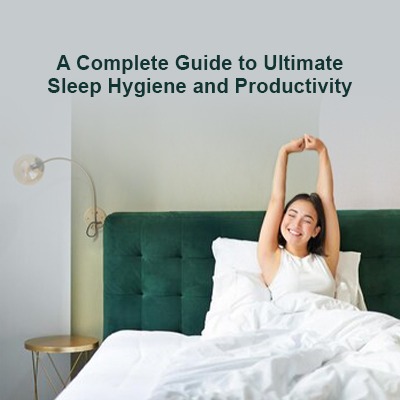A Complete Guide to Ultimate Sleep Hygiene and Productivity
For physical and mental health, it is essential to get enough quality sleep.
Everyone has experienced the struggle of falling asleep while tossing and turning in bed and waking up groggy the next day. This means we must mind our sleep hygiene as it affects our productivity, mood, and overall wellbeing.
In this article, you will find a complete guide on how to be more productive by sleeping better. We shall cover everything from creating a sleep-friendly atmosphere to setting up good sleep routines. All these suggestions will help you have a good night’s sleep whether you are an overworked parent an active lifestyle buff or anyone interested in knowing about what happens when we sleep.
What is Sleep Hygiene?
Good habits and practices promoting healthy restful sleep make up a part referred to as Sleep Hygiene. These can involve things like having a regular time for going to bed, making your bedroom comfortable for sleeping, avoiding alcohol or caffeine prior to experiencing your bedtime process, performing calming activities before retiring off to bed among others.
Sleep hygiene importance in overall health cannot be overemphasized; during this period of slumbering body regenerates itself physically while brain processes information through emotions consolidation into memories. Our bodies would not function well if both brain and body were deprived of enough rest.
The Consequences of Poor Sleep Hygiene
Poor sleep hygiene can affect your physical and mental health as well as general wellbeing in various ways. Some of these effects include:
- Tiredness And Lack Of Energy: A weak sleep hygiene can result in problems with falling or staying asleep which may make one feel tired during the daytime.
- Mood Swings: Not getting enough rest can lead to poor control of stress and emotions even depression sometimes lingers around.
- Lack Of Clear Thinking: Absence of adequate rest affects one’s ability for normal thinking; in addition, it can hinder memory and focus while making decisions.
- High Probability Of Accidents And Injuries: Being exhausted or sleepy affects perception, reaction time and even muscle coordination which predisposes one to accidents.
- Physical Ailments: Sleep deprivation has been linked with various physical conditions ranging from obesity, diabetes, heart problems to low immunity.
- Poor Quality Of Life: If you do not sleep well life enjoyment levels decrease due to reduced participation in socializing, hobbies and other interests.
The Benefits of Good Sleep Hygiene
Healthy sleep habits are essential for a good quality of life. Here are some benefits that come with healthy sleep habits:
- Improved Cognitive Function: Better memory skills, concentration powers and the ability for quick decision-making processes.
- Better Sporting Performance: It bolsters the development as well as repair of muscles
- Reduction Of Stress Levels: A feeling of relaxation and calmness
- Improved Skin Health: Your body makes collagen, a protein that keeps your skin looking healthy and young when you’re asleep.
- Enhanced Libido: getting enough quality sleep enables your body to generate hormones needed for sexual desire and arousal
- Inflammation Reduction: Inadequate sleeping may result in inflammation throughout the body leading to various chronic diseases.
- Decreased Risk Of Depression: Emotional control and risk prevention are key factors in obtaining good night’s rest.
The Factors that Affect Sleep Hygiene
There are several factors that affect sleep hygiene including;
- Sleep Environment: Temperature, lighting, noise, and bed comfort.
- Bedtime Routines: Regular routines signal to your body that it is time to sleep.
- Daytime Habits: Exercise, diet, and stress levels.
- Mental Health: Conditions such as anxiety and depression can disrupt sleep patterns.
Creating a better sleep environment
Air Quality and Temperature
To foster healthy sleep, it is best to keep the bedroom cool; between 60°F and 67°F is ideal. Buy an air purifier or use plants like aloe vera or spider plants that naturally remove impurities from the air in your bedroom. A cleaner room devoid of dust and allergens can lead to improved air quality, better sleeping conditions.
Lighting and Sound
Sleep can be interrupted by light and sound, so it is essential to make a bedroom that encourages good sleep. Use blinds with blackout curtains to block out light from outside your window, if possible. Employ white noise machines or ear plugs to minimize sound disturbances. Avoid bright overhead lights in your bedroom especially before bed time.
Selecting the Best Mattress and Pillow Options
The correct mattress and pillows are necessary for a good night’s rest. Look for a mattress that provides the right amount of support for your body type and preferred sleeping position. Your pillow should properly prop up your head and neck; this may mean replacing them every one or two years.
Bedroom Design and Organization
A cluttered disorganized bedroom makes it difficult to relax and fall asleep. Keep everything organized within designated spaces throughout your room. This will add calmness leading to tranquility at nights when you want to enjoy deep slumber without any disturbance or distraction caused by electronic gadgets like TVs, iPhones etc present in most bedrooms today.
Developing a Bedtime Routine
Maintain Consistent Sleep Schedule
Having a regular sleep schedule is part of sleep hygiene practices you have read about elsewhere over the Internet. Try going to bed at exactly the same time each night while waking up at around daybreak so as regulate natural circadian rhythm responsible for efficient falling asleep with ease as well as rising refreshed each morning.
Relaxation Practices
Reducing stress levels will help you to fall asleep more easily. For example, techniques such as deep breathing, meditation or progressive muscle relaxation can be used in preparation for a good night sleep.
Reducing Technology Use
Sleep can be disturbed by using technology, especially the blue light emitted by electronic devices which hinders the production of melatonin –a hormone responsible for inducing sleep and making us sleepy. Therefore, it is necessary to cut down on usage of technology gadgets such as phones and computers before bed so that one may have a calm sleep.
Bedtime Rituals and Habits
Creating bedtime rituals or habits helps your body recognize that it’s time to relax and get ready for bed. A peaceful routine at night might include taking warm baths with candles lit for ambiance purposes only; reading books while sipping chamomile tea; listening soft music with dim lights etc.
Establishing Healthy Daytime Habits
Physical Activity and Exercise
Exercising regularly will improve your sleeping pattern. Do moderate-intensity exercise like brisk walking (for at least 30 minutes) in most days of the week.
Nutrition and Diet
What you eat and drink has an impact on how well you sleep. Eat a well-balanced diet consisting of fresh fruits and vegetables, whole grains, lean proteins, among others. Try not to overeat or consume heavy meals before going to bed because they might lead to indigestion or discomfort. Also avoid caffeine-containing foods/drinks as well as alcoholic beverages just before retiring to bed since they negatively affect normal resting patterns during slumber stages each night when we should enjoy complete rest without any interruption whatsoever.
Anxiety and Stress Management
If anxiety or stress bothers you, it can be hard to stay asleep and fall back asleep. Regularly engage in relaxation exercises such as deep breathing or meditating to control these feelings. Keeping a journal or practicing mindfulness is also helpful.
Sleep Hygiene Mistakes to Avoid
Late Nights on Weekends
Staying up late during weekends can disturb your body’s natural sleep-wake cycle hence you will find it difficult to fall into sleep and wake up during weekdays. You might want to remain awake longer over the weekend, but endeavor to keep a regular sleep pattern.
Hitting the Snooze Button
Hitting the snooze button may seem like a harmless indulgence but actually this habit could interfere with how well you eventually sleep. This means that when you hit snooze, your alarm clock will disrupt your entire night’s rest making you feel more tired and sluggish than if you had just woken up straight away.
Sleeping with Children or Pets
Sometimes, sleeping with one’s pet or young child can be comforting but this can affect the quality of one’s sleep negatively. Pets often move around the bed at night while children make noises thus interfering with our sleep at night. To ensure better restful nights, consider creating separate sleeping spaces for your pets and children.
Not Establishing a Bedtime Routine
If you are unable to consistently maintain a predetermined routine for going to bed every other day, then it becomes difficult for your body clock in identifying when it should make you sleepy or wake you up.
Conclusion
Good sleep hygiene is critical for overall health and well-being. By creating a sleep-friendly environment, developing a bedtime routine, and establishing healthy daytime habits, you can improve your sleep quality and feel more rested and productive throughout the day. Pay attention to your sleep hygiene, and make the necessary changes to improve your sleep and overall health.







